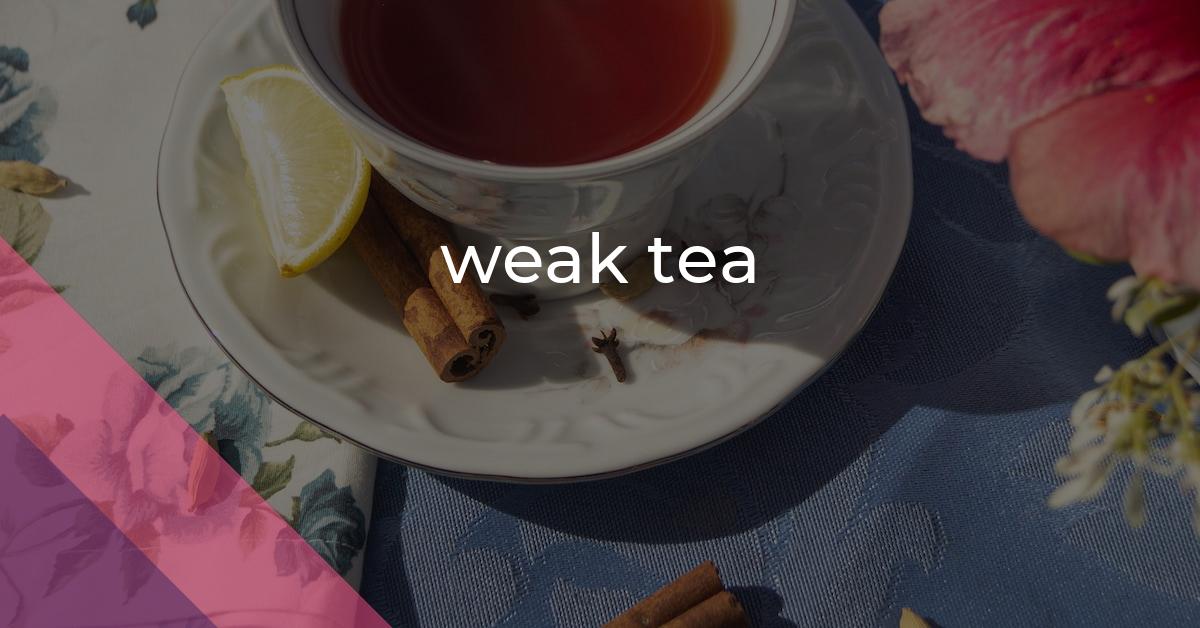weak tea: Idiom Meaning and Origin
What does ‘weak tea’ mean?
The idiom weak tea means something that is lacking flavor, strength, or substance and is generally ineffective or unimpressive.

Idiom Explorer
The idiom "weak sister" is used to describe someone who is not strong or capable. It can also refer to something that is of inferior quality or lacking in power.
The idiom "weaker vessel" is used to refer to women, particularly in a derogatory or patronizing way, implying that they are weaker or more fragile than men.
The idiom "water down" means to dilute or weaken something, making it less potent or effective.
The idiom "to little avail" means that despite efforts or attempts, there is little or no positive outcome or effect. It implies that something has been done without achieving the desired result or benefit.
The idiom "teeny weeny" means something extremely small or tiny.
The idiom "teensy weensy" is used to describe something that is very small in size or quantity.
An idiom widely used to refer to something insignificant or unimportant. It implies that the mentioned object or amount is of little value or significance.
An idiom used to describe someone who is physically or mentally weak or ill. It can also refer to a country or system that is struggling or in decline.
Decoding the Enigma
The idiom *weak tea* is often used to describe something that is lacking in strength or substance. It can be applied to ideas, arguments, or statements that are considered to be unconvincing or unimpressive. The origin of this idiom is uncertain, but it is believed to have originated in the United States in the early 20th century.
One possible explanation for the use of "weak tea" to describe something lacking in strength or potency is that weakly brewed tea has a lighter color and a milder flavor compared to tea that is brewed for a longer period of time or with more tea leaves. This analogy highlights the idea that weak tea is diluted, flavorless, and insipid. The idiom has since become a colorful way to express disappointment or dissatisfaction with something that is considered to be lacking.
The idiom *weak tea* is commonly used in informal contexts, such as everyday conversation. It can be applied to a wide range of situations and is often used as a way to criticize or express a negative opinion about something. For instance, if someone finds a political candidate's speech unconvincing or lacking in substance, they might describe it as "weak tea". Similarly, a movie that is deemed to be uninteresting or lacking in depth may be referred to as "weak tea".
It is worth noting that the idiom *weak tea* is typically used in a negative or critical manner. By describing something as "weak tea", the user is essentially stating that it does not meet their standards or expectations. It is a way to express disappointment or to imply that the thing being described is lacking.
While the idiom *weak tea* is widely used and understood, its usage may vary depending on regional dialect or cultural context. Different regions may have their own idiomatic expressions to convey a similar meaning. However, the underlying concept of something being weak, diluted, or lacking substance remains consistent.
Another idiom that is related to weak tea is "chocolate teapot". This idiom is used to describe something that is completely useless or non-functional. Just as a teapot made out of chocolate would melt when hot water is added, something described as a chocolate teapot is deemed incapable of fulfilling its intended purpose. This idiom is often used to express frustration or disappointment with something that proves to be ineffective or impractical.
Similarly, the idiom "weak sister" can also be related to weak tea. This idiom is used to describe someone or something that is considered to be weak or lacking in capability. It can be applied to a person who is seen as lacking strength or resolve, or to a thing that is deemed insufficient or ineffective. The phrase "weak sister" is typically used in a somewhat derogatory manner, suggesting that the person or thing being described is not up to par.
The idiom *weak tea* is commonly used to describe something that is lacking in strength or substance. Its origin is uncertain, but it likely stems from the comparison to weakly brewed tea. The idiom is used in informal contexts and has a negative connotation, implying disappointment or dissatisfaction. Its usage may vary depending on regional dialect or cultural context. Additionally, the related idioms "chocolate teapot" and "weak sister" also convey the notion of something being weak, ineffective, or lacking in capability.
Example usage
Examples of how the idiom "weak tea" can be used in a sentence:
- 1. The new movie was quite a disappointment, it was just weak tea compared to the original.
- 2. His argument was weak tea and didn't convince anyone in the room.
- 3. The singer's performance was weak tea, lacking the emotion and power we were expecting.
The idiom "weak tea" is used to describe something that is lacking strength, power, or effectiveness, often used to express disappointment or dissatisfaction with a particular thing. It can be used in various contexts, such as comparing a new version of something to the original, evaluating the persuasiveness of an argument, or assessing the performance of an artist or performer.
More "Expressions" idioms



